Ethical Evaluation of Patient Dignity Violations in ICU Settings
VerifiedAdded on 2022/08/18
|13
|3726
|14
Essay
AI Summary
This essay critically evaluates the ethical problems associated with violations of patient dignity in the Intensive Care Unit (ICU). It explores how the fast-paced environment and critical health conditions of ICU patients can lead to the neglect of patient dignity, comparing these issues with ethical principles such as autonomy, beneficence, and non-maleficence. The essay examines theoretical and empirical evidence, highlighting how factors like loss of autonomy, communication gaps, and institutional barriers contribute to dignity violations. It also discusses the importance of human rights and the role of ethical theories like deontology in guiding healthcare professionals. The essay suggests solutions, emphasizing the need for training, empathy, and leadership strategies to promote respectful care and address ethical concerns, ultimately aiming to improve patient satisfaction and trust in healthcare services. The essay also references the NMC code of ethics for nurses and midwives to highlight the importance of upholding the dignity of individuals and preserving human rights.
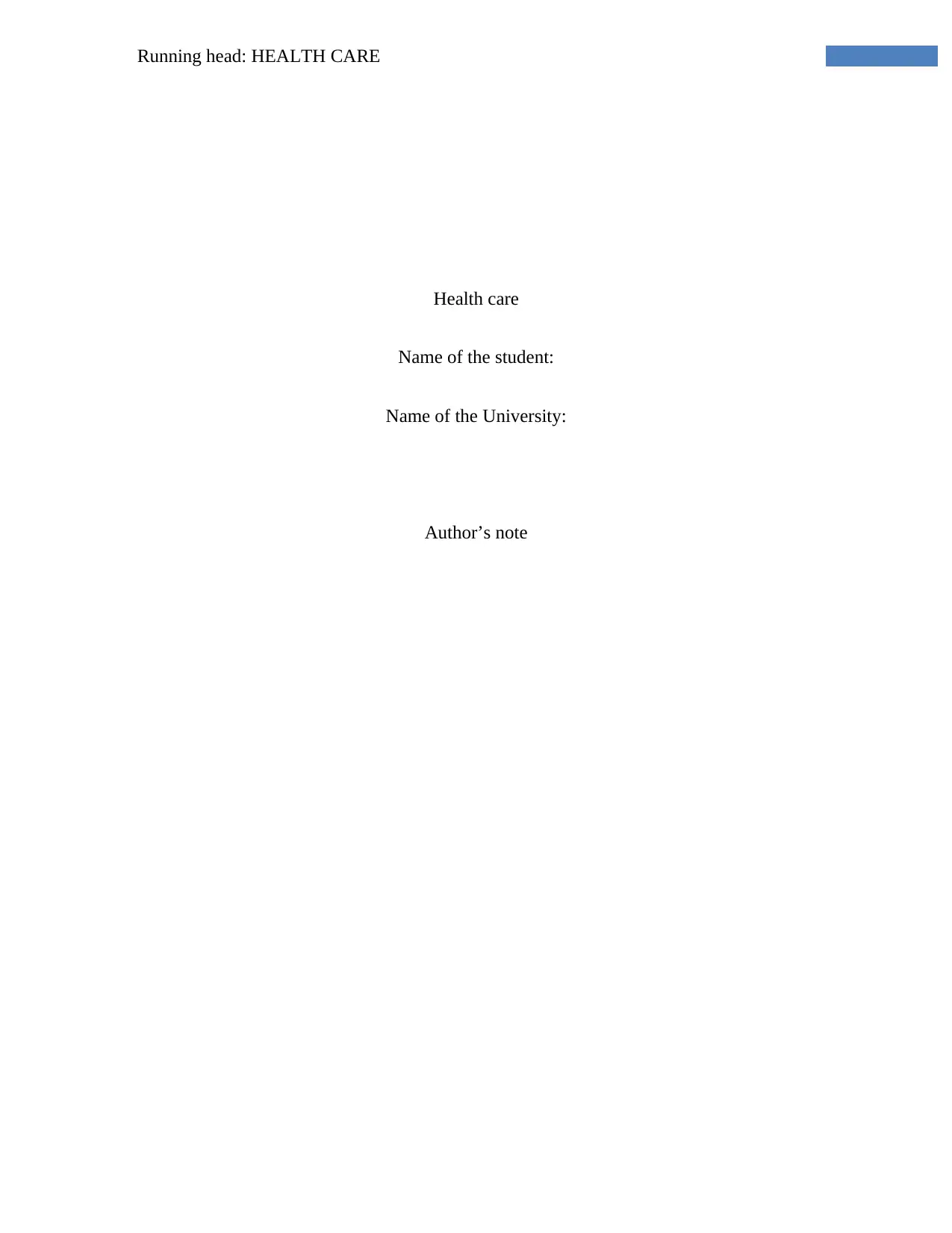
Running head: HEALTH CARE
Health care
Name of the student:
Name of the University:
Author’s note
Health care
Name of the student:
Name of the University:
Author’s note
Paraphrase This Document
Need a fresh take? Get an instant paraphrase of this document with our AI Paraphraser
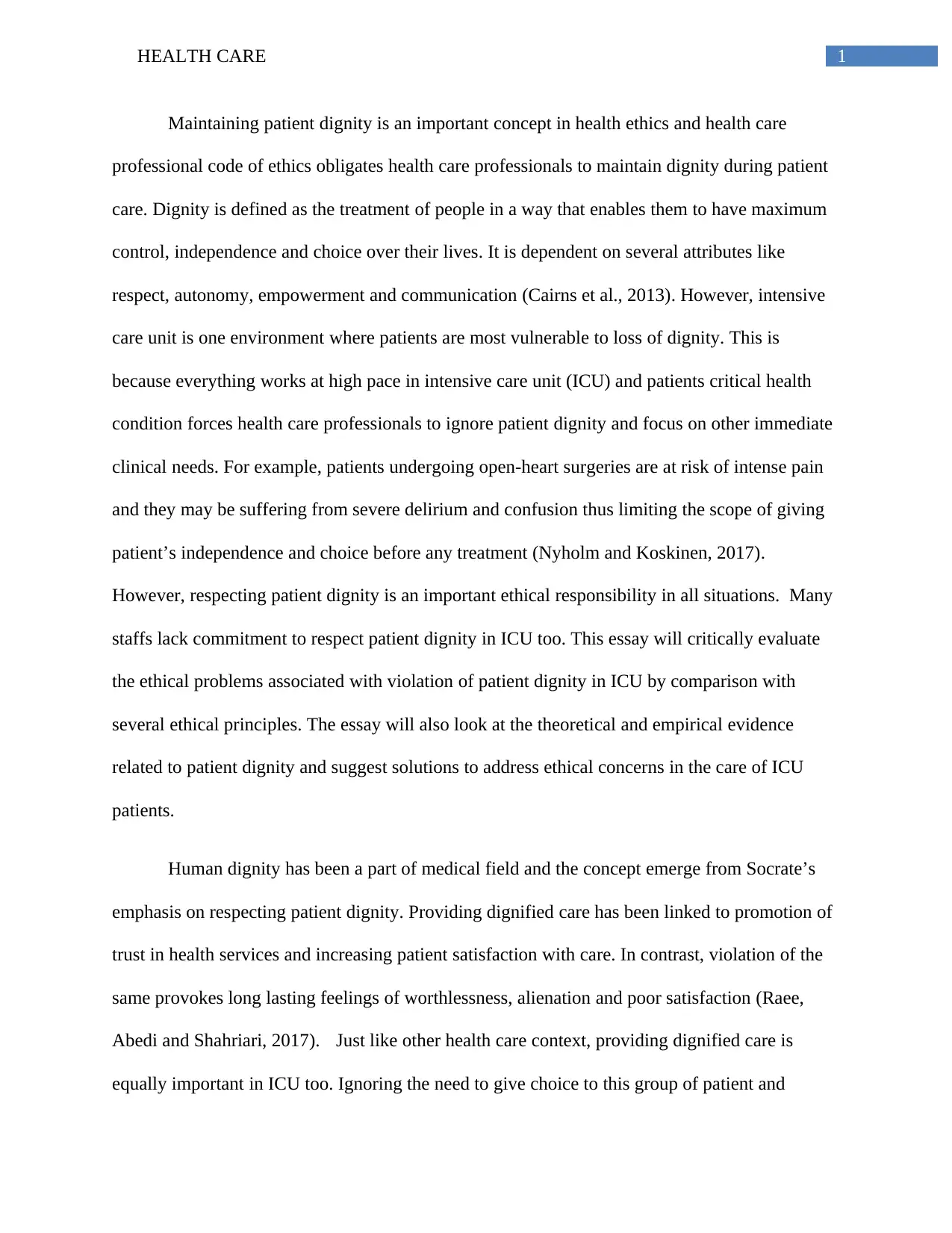
1HEALTH CARE
Maintaining patient dignity is an important concept in health ethics and health care
professional code of ethics obligates health care professionals to maintain dignity during patient
care. Dignity is defined as the treatment of people in a way that enables them to have maximum
control, independence and choice over their lives. It is dependent on several attributes like
respect, autonomy, empowerment and communication (Cairns et al., 2013). However, intensive
care unit is one environment where patients are most vulnerable to loss of dignity. This is
because everything works at high pace in intensive care unit (ICU) and patients critical health
condition forces health care professionals to ignore patient dignity and focus on other immediate
clinical needs. For example, patients undergoing open-heart surgeries are at risk of intense pain
and they may be suffering from severe delirium and confusion thus limiting the scope of giving
patient’s independence and choice before any treatment (Nyholm and Koskinen, 2017).
However, respecting patient dignity is an important ethical responsibility in all situations. Many
staffs lack commitment to respect patient dignity in ICU too. This essay will critically evaluate
the ethical problems associated with violation of patient dignity in ICU by comparison with
several ethical principles. The essay will also look at the theoretical and empirical evidence
related to patient dignity and suggest solutions to address ethical concerns in the care of ICU
patients.
Human dignity has been a part of medical field and the concept emerge from Socrate’s
emphasis on respecting patient dignity. Providing dignified care has been linked to promotion of
trust in health services and increasing patient satisfaction with care. In contrast, violation of the
same provokes long lasting feelings of worthlessness, alienation and poor satisfaction (Raee,
Abedi and Shahriari, 2017). Just like other health care context, providing dignified care is
equally important in ICU too. Ignoring the need to give choice to this group of patient and
Maintaining patient dignity is an important concept in health ethics and health care
professional code of ethics obligates health care professionals to maintain dignity during patient
care. Dignity is defined as the treatment of people in a way that enables them to have maximum
control, independence and choice over their lives. It is dependent on several attributes like
respect, autonomy, empowerment and communication (Cairns et al., 2013). However, intensive
care unit is one environment where patients are most vulnerable to loss of dignity. This is
because everything works at high pace in intensive care unit (ICU) and patients critical health
condition forces health care professionals to ignore patient dignity and focus on other immediate
clinical needs. For example, patients undergoing open-heart surgeries are at risk of intense pain
and they may be suffering from severe delirium and confusion thus limiting the scope of giving
patient’s independence and choice before any treatment (Nyholm and Koskinen, 2017).
However, respecting patient dignity is an important ethical responsibility in all situations. Many
staffs lack commitment to respect patient dignity in ICU too. This essay will critically evaluate
the ethical problems associated with violation of patient dignity in ICU by comparison with
several ethical principles. The essay will also look at the theoretical and empirical evidence
related to patient dignity and suggest solutions to address ethical concerns in the care of ICU
patients.
Human dignity has been a part of medical field and the concept emerge from Socrate’s
emphasis on respecting patient dignity. Providing dignified care has been linked to promotion of
trust in health services and increasing patient satisfaction with care. In contrast, violation of the
same provokes long lasting feelings of worthlessness, alienation and poor satisfaction (Raee,
Abedi and Shahriari, 2017). Just like other health care context, providing dignified care is
equally important in ICU too. Ignoring the need to give choice to this group of patient and
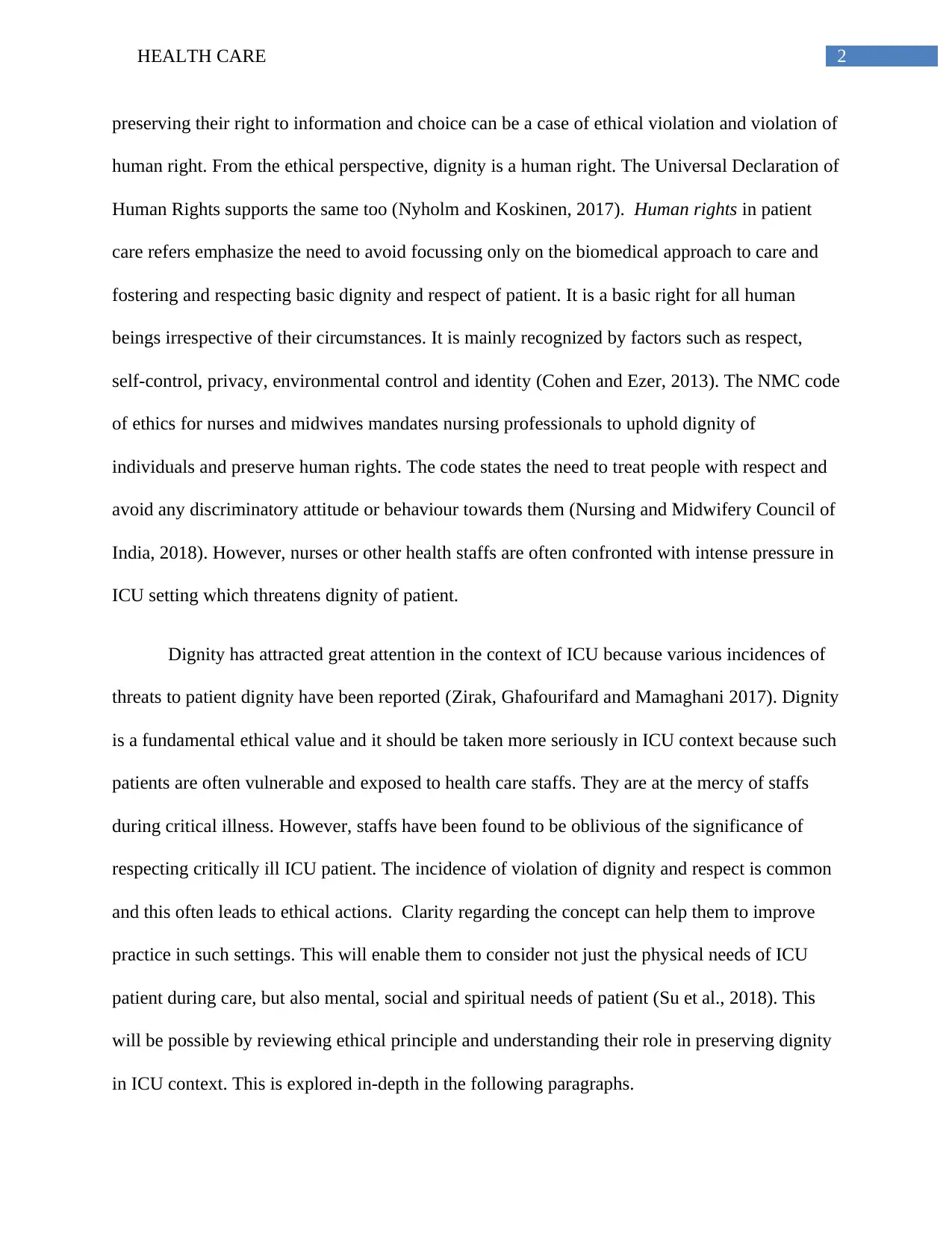
2HEALTH CARE
preserving their right to information and choice can be a case of ethical violation and violation of
human right. From the ethical perspective, dignity is a human right. The Universal Declaration of
Human Rights supports the same too (Nyholm and Koskinen, 2017). Human rights in patient
care refers emphasize the need to avoid focussing only on the biomedical approach to care and
fostering and respecting basic dignity and respect of patient. It is a basic right for all human
beings irrespective of their circumstances. It is mainly recognized by factors such as respect,
self-control, privacy, environmental control and identity (Cohen and Ezer, 2013). The NMC code
of ethics for nurses and midwives mandates nursing professionals to uphold dignity of
individuals and preserve human rights. The code states the need to treat people with respect and
avoid any discriminatory attitude or behaviour towards them (Nursing and Midwifery Council of
India, 2018). However, nurses or other health staffs are often confronted with intense pressure in
ICU setting which threatens dignity of patient.
Dignity has attracted great attention in the context of ICU because various incidences of
threats to patient dignity have been reported (Zirak, Ghafourifard and Mamaghani 2017). Dignity
is a fundamental ethical value and it should be taken more seriously in ICU context because such
patients are often vulnerable and exposed to health care staffs. They are at the mercy of staffs
during critical illness. However, staffs have been found to be oblivious of the significance of
respecting critically ill ICU patient. The incidence of violation of dignity and respect is common
and this often leads to ethical actions. Clarity regarding the concept can help them to improve
practice in such settings. This will enable them to consider not just the physical needs of ICU
patient during care, but also mental, social and spiritual needs of patient (Su et al., 2018). This
will be possible by reviewing ethical principle and understanding their role in preserving dignity
in ICU context. This is explored in-depth in the following paragraphs.
preserving their right to information and choice can be a case of ethical violation and violation of
human right. From the ethical perspective, dignity is a human right. The Universal Declaration of
Human Rights supports the same too (Nyholm and Koskinen, 2017). Human rights in patient
care refers emphasize the need to avoid focussing only on the biomedical approach to care and
fostering and respecting basic dignity and respect of patient. It is a basic right for all human
beings irrespective of their circumstances. It is mainly recognized by factors such as respect,
self-control, privacy, environmental control and identity (Cohen and Ezer, 2013). The NMC code
of ethics for nurses and midwives mandates nursing professionals to uphold dignity of
individuals and preserve human rights. The code states the need to treat people with respect and
avoid any discriminatory attitude or behaviour towards them (Nursing and Midwifery Council of
India, 2018). However, nurses or other health staffs are often confronted with intense pressure in
ICU setting which threatens dignity of patient.
Dignity has attracted great attention in the context of ICU because various incidences of
threats to patient dignity have been reported (Zirak, Ghafourifard and Mamaghani 2017). Dignity
is a fundamental ethical value and it should be taken more seriously in ICU context because such
patients are often vulnerable and exposed to health care staffs. They are at the mercy of staffs
during critical illness. However, staffs have been found to be oblivious of the significance of
respecting critically ill ICU patient. The incidence of violation of dignity and respect is common
and this often leads to ethical actions. Clarity regarding the concept can help them to improve
practice in such settings. This will enable them to consider not just the physical needs of ICU
patient during care, but also mental, social and spiritual needs of patient (Su et al., 2018). This
will be possible by reviewing ethical principle and understanding their role in preserving dignity
in ICU context. This is explored in-depth in the following paragraphs.
⊘ This is a preview!⊘
Do you want full access?
Subscribe today to unlock all pages.

Trusted by 1+ million students worldwide
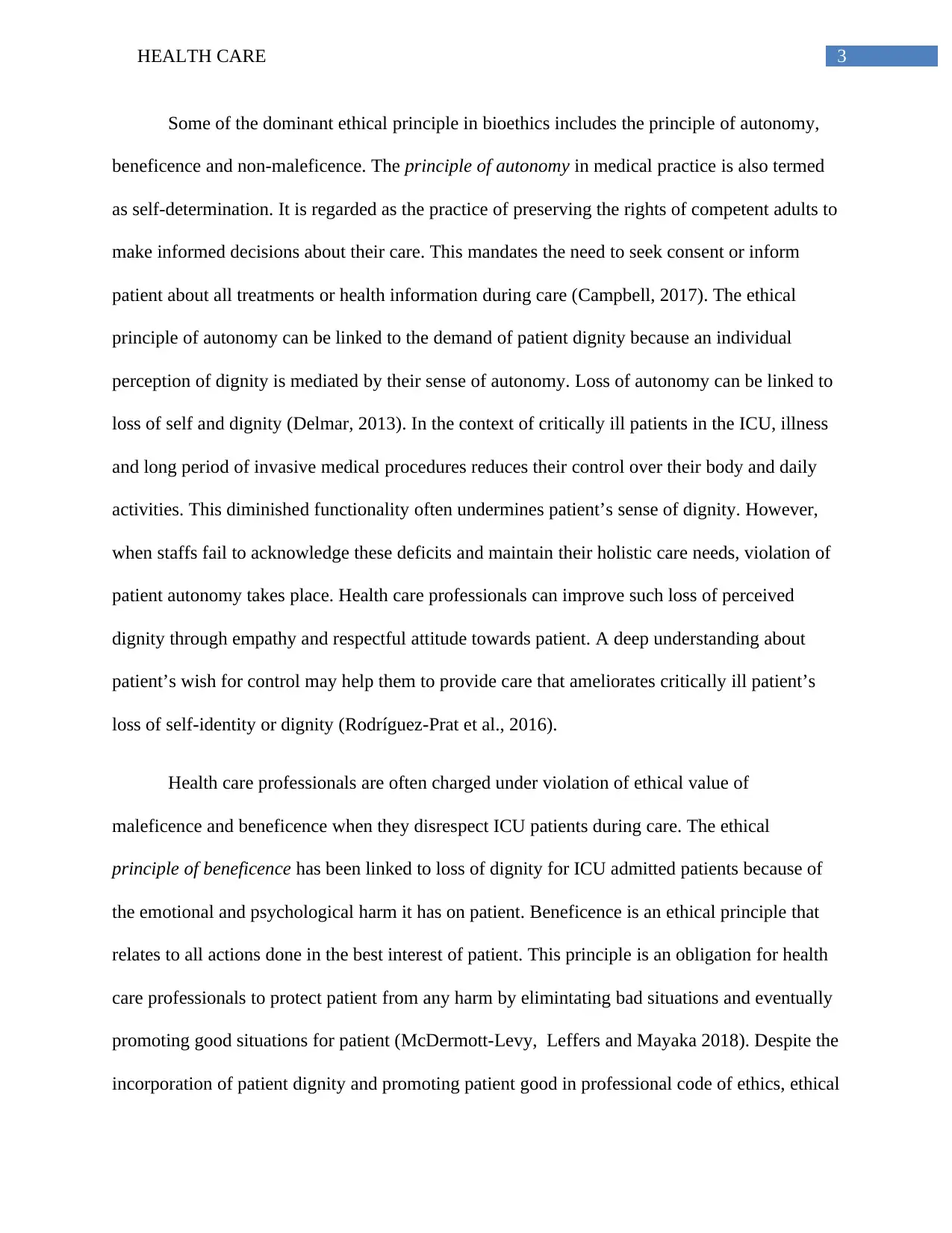
3HEALTH CARE
Some of the dominant ethical principle in bioethics includes the principle of autonomy,
beneficence and non-maleficence. The principle of autonomy in medical practice is also termed
as self-determination. It is regarded as the practice of preserving the rights of competent adults to
make informed decisions about their care. This mandates the need to seek consent or inform
patient about all treatments or health information during care (Campbell, 2017). The ethical
principle of autonomy can be linked to the demand of patient dignity because an individual
perception of dignity is mediated by their sense of autonomy. Loss of autonomy can be linked to
loss of self and dignity (Delmar, 2013). In the context of critically ill patients in the ICU, illness
and long period of invasive medical procedures reduces their control over their body and daily
activities. This diminished functionality often undermines patient’s sense of dignity. However,
when staffs fail to acknowledge these deficits and maintain their holistic care needs, violation of
patient autonomy takes place. Health care professionals can improve such loss of perceived
dignity through empathy and respectful attitude towards patient. A deep understanding about
patient’s wish for control may help them to provide care that ameliorates critically ill patient’s
loss of self-identity or dignity (Rodríguez-Prat et al., 2016).
Health care professionals are often charged under violation of ethical value of
maleficence and beneficence when they disrespect ICU patients during care. The ethical
principle of beneficence has been linked to loss of dignity for ICU admitted patients because of
the emotional and psychological harm it has on patient. Beneficence is an ethical principle that
relates to all actions done in the best interest of patient. This principle is an obligation for health
care professionals to protect patient from any harm by elimintating bad situations and eventually
promoting good situations for patient (McDermott-Levy, Leffers and Mayaka 2018). Despite the
incorporation of patient dignity and promoting patient good in professional code of ethics, ethical
Some of the dominant ethical principle in bioethics includes the principle of autonomy,
beneficence and non-maleficence. The principle of autonomy in medical practice is also termed
as self-determination. It is regarded as the practice of preserving the rights of competent adults to
make informed decisions about their care. This mandates the need to seek consent or inform
patient about all treatments or health information during care (Campbell, 2017). The ethical
principle of autonomy can be linked to the demand of patient dignity because an individual
perception of dignity is mediated by their sense of autonomy. Loss of autonomy can be linked to
loss of self and dignity (Delmar, 2013). In the context of critically ill patients in the ICU, illness
and long period of invasive medical procedures reduces their control over their body and daily
activities. This diminished functionality often undermines patient’s sense of dignity. However,
when staffs fail to acknowledge these deficits and maintain their holistic care needs, violation of
patient autonomy takes place. Health care professionals can improve such loss of perceived
dignity through empathy and respectful attitude towards patient. A deep understanding about
patient’s wish for control may help them to provide care that ameliorates critically ill patient’s
loss of self-identity or dignity (Rodríguez-Prat et al., 2016).
Health care professionals are often charged under violation of ethical value of
maleficence and beneficence when they disrespect ICU patients during care. The ethical
principle of beneficence has been linked to loss of dignity for ICU admitted patients because of
the emotional and psychological harm it has on patient. Beneficence is an ethical principle that
relates to all actions done in the best interest of patient. This principle is an obligation for health
care professionals to protect patient from any harm by elimintating bad situations and eventually
promoting good situations for patient (McDermott-Levy, Leffers and Mayaka 2018). Despite the
incorporation of patient dignity and promoting patient good in professional code of ethics, ethical
Paraphrase This Document
Need a fresh take? Get an instant paraphrase of this document with our AI Paraphraser
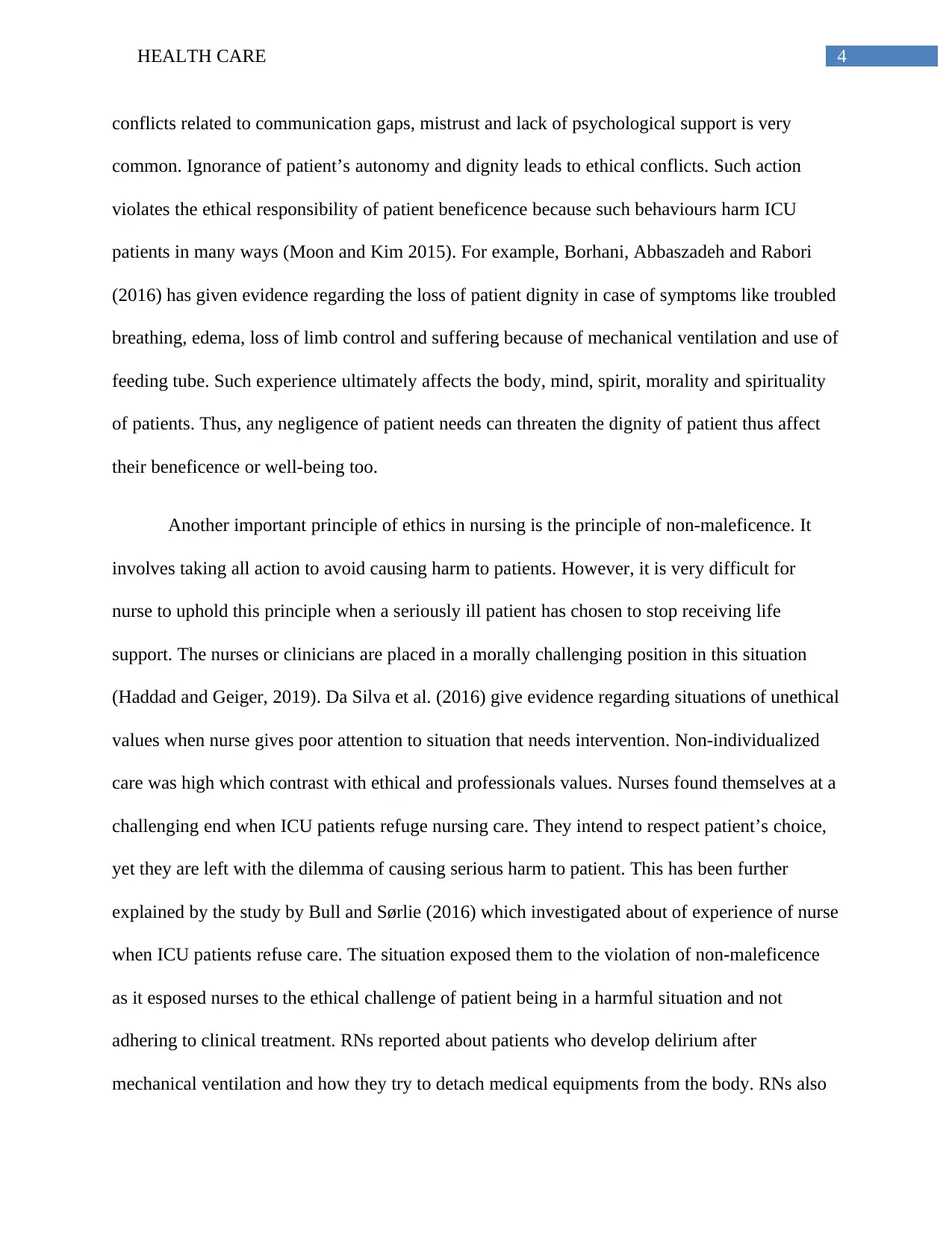
4HEALTH CARE
conflicts related to communication gaps, mistrust and lack of psychological support is very
common. Ignorance of patient’s autonomy and dignity leads to ethical conflicts. Such action
violates the ethical responsibility of patient beneficence because such behaviours harm ICU
patients in many ways (Moon and Kim 2015). For example, Borhani, Abbaszadeh and Rabori
(2016) has given evidence regarding the loss of patient dignity in case of symptoms like troubled
breathing, edema, loss of limb control and suffering because of mechanical ventilation and use of
feeding tube. Such experience ultimately affects the body, mind, spirit, morality and spirituality
of patients. Thus, any negligence of patient needs can threaten the dignity of patient thus affect
their beneficence or well-being too.
Another important principle of ethics in nursing is the principle of non-maleficence. It
involves taking all action to avoid causing harm to patients. However, it is very difficult for
nurse to uphold this principle when a seriously ill patient has chosen to stop receiving life
support. The nurses or clinicians are placed in a morally challenging position in this situation
(Haddad and Geiger, 2019). Da Silva et al. (2016) give evidence regarding situations of unethical
values when nurse gives poor attention to situation that needs intervention. Non-individualized
care was high which contrast with ethical and professionals values. Nurses found themselves at a
challenging end when ICU patients refuge nursing care. They intend to respect patient’s choice,
yet they are left with the dilemma of causing serious harm to patient. This has been further
explained by the study by Bull and Sørlie (2016) which investigated about of experience of nurse
when ICU patients refuse care. The situation exposed them to the violation of non-maleficence
as it esposed nurses to the ethical challenge of patient being in a harmful situation and not
adhering to clinical treatment. RNs reported about patients who develop delirium after
mechanical ventilation and how they try to detach medical equipments from the body. RNs also
conflicts related to communication gaps, mistrust and lack of psychological support is very
common. Ignorance of patient’s autonomy and dignity leads to ethical conflicts. Such action
violates the ethical responsibility of patient beneficence because such behaviours harm ICU
patients in many ways (Moon and Kim 2015). For example, Borhani, Abbaszadeh and Rabori
(2016) has given evidence regarding the loss of patient dignity in case of symptoms like troubled
breathing, edema, loss of limb control and suffering because of mechanical ventilation and use of
feeding tube. Such experience ultimately affects the body, mind, spirit, morality and spirituality
of patients. Thus, any negligence of patient needs can threaten the dignity of patient thus affect
their beneficence or well-being too.
Another important principle of ethics in nursing is the principle of non-maleficence. It
involves taking all action to avoid causing harm to patients. However, it is very difficult for
nurse to uphold this principle when a seriously ill patient has chosen to stop receiving life
support. The nurses or clinicians are placed in a morally challenging position in this situation
(Haddad and Geiger, 2019). Da Silva et al. (2016) give evidence regarding situations of unethical
values when nurse gives poor attention to situation that needs intervention. Non-individualized
care was high which contrast with ethical and professionals values. Nurses found themselves at a
challenging end when ICU patients refuge nursing care. They intend to respect patient’s choice,
yet they are left with the dilemma of causing serious harm to patient. This has been further
explained by the study by Bull and Sørlie (2016) which investigated about of experience of nurse
when ICU patients refuse care. The situation exposed them to the violation of non-maleficence
as it esposed nurses to the ethical challenge of patient being in a harmful situation and not
adhering to clinical treatment. RNs reported about patients who develop delirium after
mechanical ventilation and how they try to detach medical equipments from the body. RNs also
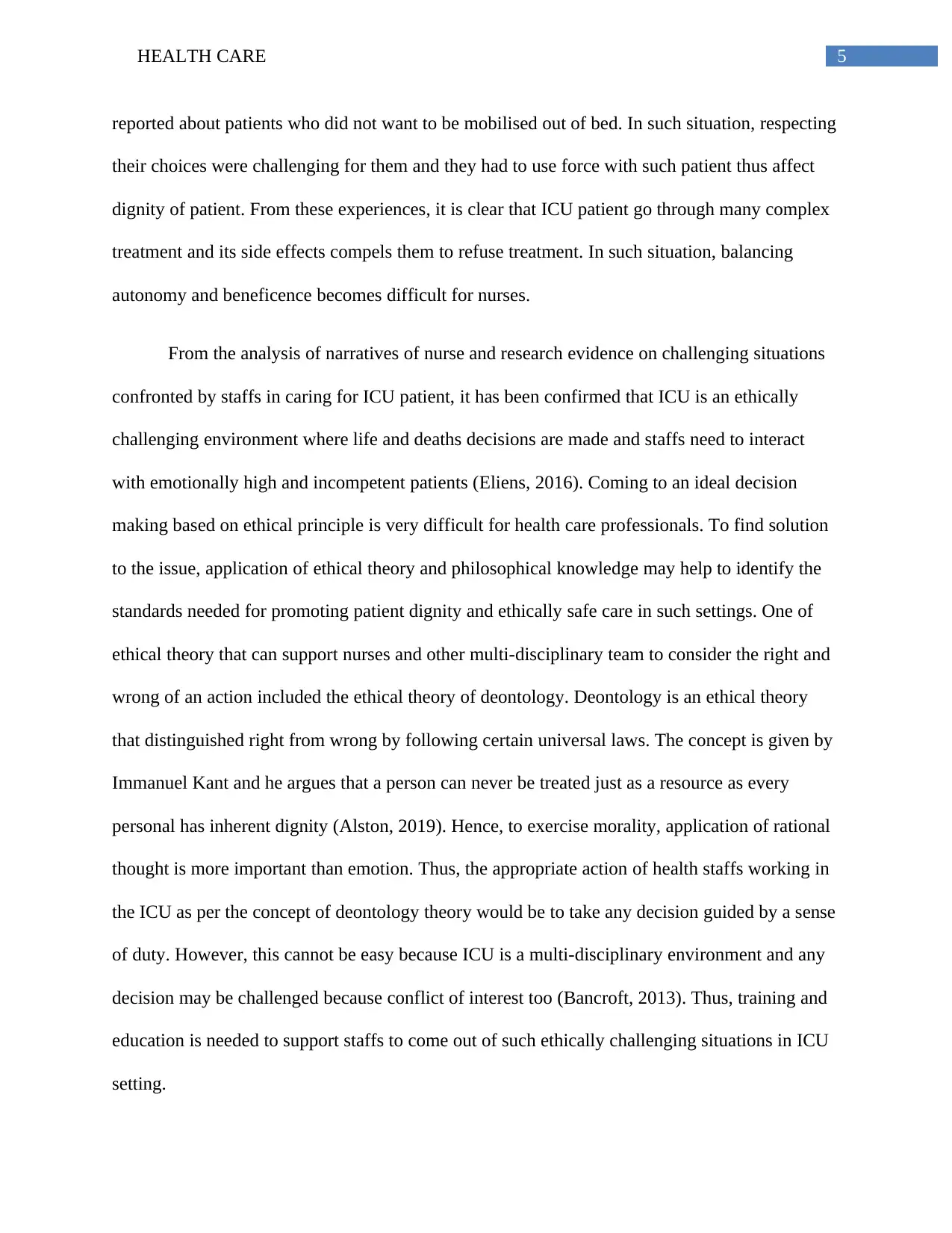
5HEALTH CARE
reported about patients who did not want to be mobilised out of bed. In such situation, respecting
their choices were challenging for them and they had to use force with such patient thus affect
dignity of patient. From these experiences, it is clear that ICU patient go through many complex
treatment and its side effects compels them to refuse treatment. In such situation, balancing
autonomy and beneficence becomes difficult for nurses.
From the analysis of narratives of nurse and research evidence on challenging situations
confronted by staffs in caring for ICU patient, it has been confirmed that ICU is an ethically
challenging environment where life and deaths decisions are made and staffs need to interact
with emotionally high and incompetent patients (Eliens, 2016). Coming to an ideal decision
making based on ethical principle is very difficult for health care professionals. To find solution
to the issue, application of ethical theory and philosophical knowledge may help to identify the
standards needed for promoting patient dignity and ethically safe care in such settings. One of
ethical theory that can support nurses and other multi-disciplinary team to consider the right and
wrong of an action included the ethical theory of deontology. Deontology is an ethical theory
that distinguished right from wrong by following certain universal laws. The concept is given by
Immanuel Kant and he argues that a person can never be treated just as a resource as every
personal has inherent dignity (Alston, 2019). Hence, to exercise morality, application of rational
thought is more important than emotion. Thus, the appropriate action of health staffs working in
the ICU as per the concept of deontology theory would be to take any decision guided by a sense
of duty. However, this cannot be easy because ICU is a multi-disciplinary environment and any
decision may be challenged because conflict of interest too (Bancroft, 2013). Thus, training and
education is needed to support staffs to come out of such ethically challenging situations in ICU
setting.
reported about patients who did not want to be mobilised out of bed. In such situation, respecting
their choices were challenging for them and they had to use force with such patient thus affect
dignity of patient. From these experiences, it is clear that ICU patient go through many complex
treatment and its side effects compels them to refuse treatment. In such situation, balancing
autonomy and beneficence becomes difficult for nurses.
From the analysis of narratives of nurse and research evidence on challenging situations
confronted by staffs in caring for ICU patient, it has been confirmed that ICU is an ethically
challenging environment where life and deaths decisions are made and staffs need to interact
with emotionally high and incompetent patients (Eliens, 2016). Coming to an ideal decision
making based on ethical principle is very difficult for health care professionals. To find solution
to the issue, application of ethical theory and philosophical knowledge may help to identify the
standards needed for promoting patient dignity and ethically safe care in such settings. One of
ethical theory that can support nurses and other multi-disciplinary team to consider the right and
wrong of an action included the ethical theory of deontology. Deontology is an ethical theory
that distinguished right from wrong by following certain universal laws. The concept is given by
Immanuel Kant and he argues that a person can never be treated just as a resource as every
personal has inherent dignity (Alston, 2019). Hence, to exercise morality, application of rational
thought is more important than emotion. Thus, the appropriate action of health staffs working in
the ICU as per the concept of deontology theory would be to take any decision guided by a sense
of duty. However, this cannot be easy because ICU is a multi-disciplinary environment and any
decision may be challenged because conflict of interest too (Bancroft, 2013). Thus, training and
education is needed to support staffs to come out of such ethically challenging situations in ICU
setting.
⊘ This is a preview!⊘
Do you want full access?
Subscribe today to unlock all pages.

Trusted by 1+ million students worldwide
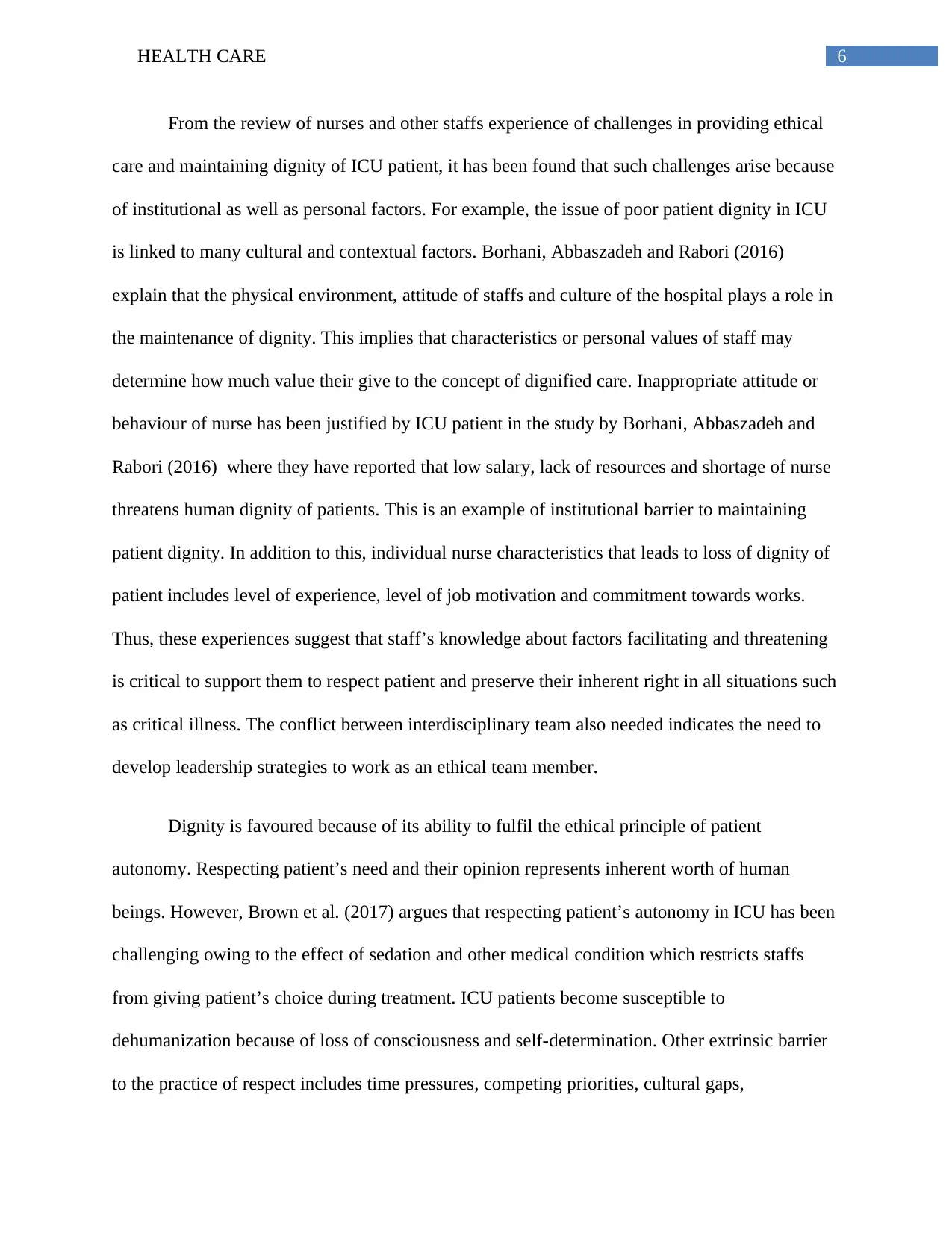
6HEALTH CARE
From the review of nurses and other staffs experience of challenges in providing ethical
care and maintaining dignity of ICU patient, it has been found that such challenges arise because
of institutional as well as personal factors. For example, the issue of poor patient dignity in ICU
is linked to many cultural and contextual factors. Borhani, Abbaszadeh and Rabori (2016)
explain that the physical environment, attitude of staffs and culture of the hospital plays a role in
the maintenance of dignity. This implies that characteristics or personal values of staff may
determine how much value their give to the concept of dignified care. Inappropriate attitude or
behaviour of nurse has been justified by ICU patient in the study by Borhani, Abbaszadeh and
Rabori (2016) where they have reported that low salary, lack of resources and shortage of nurse
threatens human dignity of patients. This is an example of institutional barrier to maintaining
patient dignity. In addition to this, individual nurse characteristics that leads to loss of dignity of
patient includes level of experience, level of job motivation and commitment towards works.
Thus, these experiences suggest that staff’s knowledge about factors facilitating and threatening
is critical to support them to respect patient and preserve their inherent right in all situations such
as critical illness. The conflict between interdisciplinary team also needed indicates the need to
develop leadership strategies to work as an ethical team member.
Dignity is favoured because of its ability to fulfil the ethical principle of patient
autonomy. Respecting patient’s need and their opinion represents inherent worth of human
beings. However, Brown et al. (2017) argues that respecting patient’s autonomy in ICU has been
challenging owing to the effect of sedation and other medical condition which restricts staffs
from giving patient’s choice during treatment. ICU patients become susceptible to
dehumanization because of loss of consciousness and self-determination. Other extrinsic barrier
to the practice of respect includes time pressures, competing priorities, cultural gaps,
From the review of nurses and other staffs experience of challenges in providing ethical
care and maintaining dignity of ICU patient, it has been found that such challenges arise because
of institutional as well as personal factors. For example, the issue of poor patient dignity in ICU
is linked to many cultural and contextual factors. Borhani, Abbaszadeh and Rabori (2016)
explain that the physical environment, attitude of staffs and culture of the hospital plays a role in
the maintenance of dignity. This implies that characteristics or personal values of staff may
determine how much value their give to the concept of dignified care. Inappropriate attitude or
behaviour of nurse has been justified by ICU patient in the study by Borhani, Abbaszadeh and
Rabori (2016) where they have reported that low salary, lack of resources and shortage of nurse
threatens human dignity of patients. This is an example of institutional barrier to maintaining
patient dignity. In addition to this, individual nurse characteristics that leads to loss of dignity of
patient includes level of experience, level of job motivation and commitment towards works.
Thus, these experiences suggest that staff’s knowledge about factors facilitating and threatening
is critical to support them to respect patient and preserve their inherent right in all situations such
as critical illness. The conflict between interdisciplinary team also needed indicates the need to
develop leadership strategies to work as an ethical team member.
Dignity is favoured because of its ability to fulfil the ethical principle of patient
autonomy. Respecting patient’s need and their opinion represents inherent worth of human
beings. However, Brown et al. (2017) argues that respecting patient’s autonomy in ICU has been
challenging owing to the effect of sedation and other medical condition which restricts staffs
from giving patient’s choice during treatment. ICU patients become susceptible to
dehumanization because of loss of consciousness and self-determination. Other extrinsic barrier
to the practice of respect includes time pressures, competing priorities, cultural gaps,
Paraphrase This Document
Need a fresh take? Get an instant paraphrase of this document with our AI Paraphraser
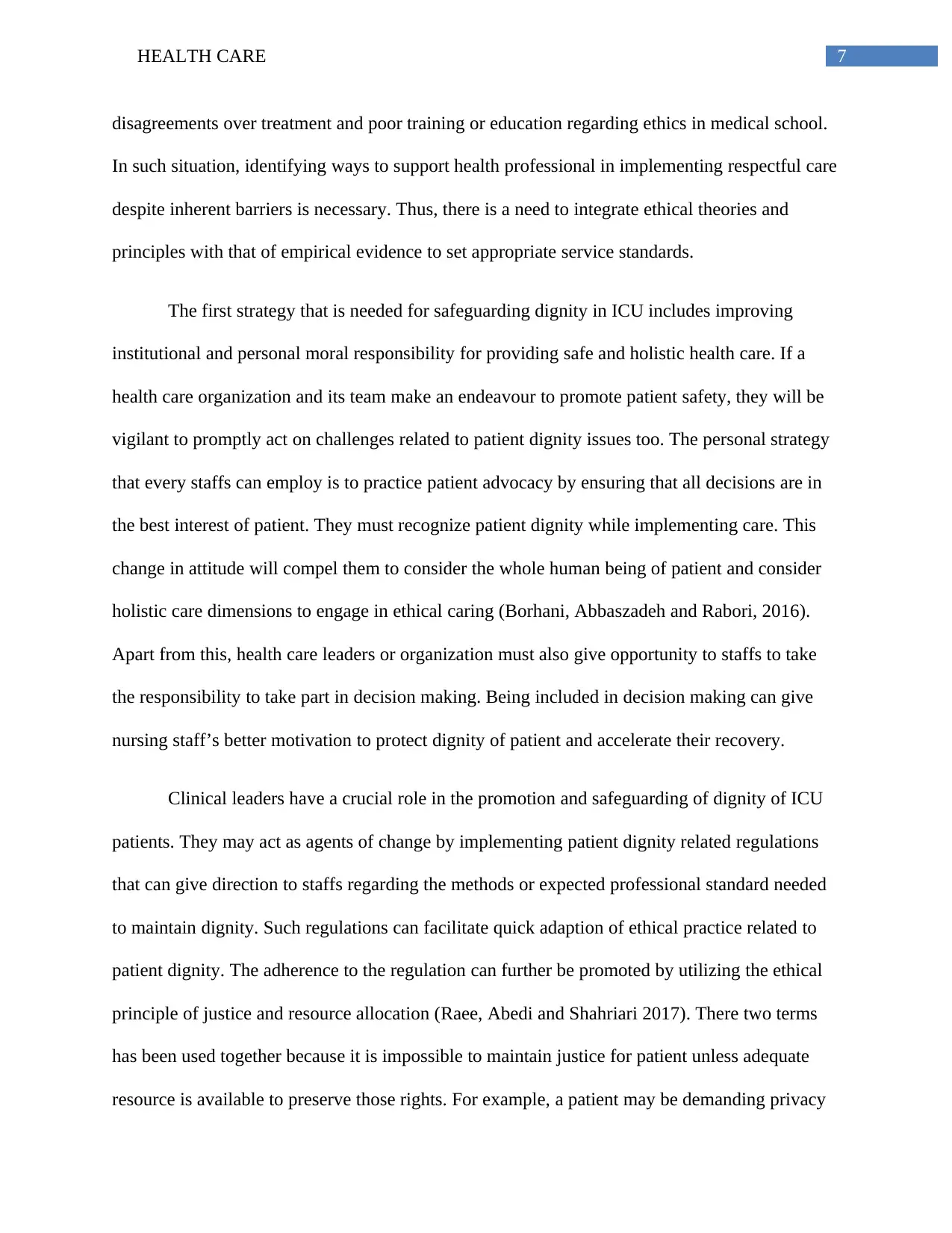
7HEALTH CARE
disagreements over treatment and poor training or education regarding ethics in medical school.
In such situation, identifying ways to support health professional in implementing respectful care
despite inherent barriers is necessary. Thus, there is a need to integrate ethical theories and
principles with that of empirical evidence to set appropriate service standards.
The first strategy that is needed for safeguarding dignity in ICU includes improving
institutional and personal moral responsibility for providing safe and holistic health care. If a
health care organization and its team make an endeavour to promote patient safety, they will be
vigilant to promptly act on challenges related to patient dignity issues too. The personal strategy
that every staffs can employ is to practice patient advocacy by ensuring that all decisions are in
the best interest of patient. They must recognize patient dignity while implementing care. This
change in attitude will compel them to consider the whole human being of patient and consider
holistic care dimensions to engage in ethical caring (Borhani, Abbaszadeh and Rabori, 2016).
Apart from this, health care leaders or organization must also give opportunity to staffs to take
the responsibility to take part in decision making. Being included in decision making can give
nursing staff’s better motivation to protect dignity of patient and accelerate their recovery.
Clinical leaders have a crucial role in the promotion and safeguarding of dignity of ICU
patients. They may act as agents of change by implementing patient dignity related regulations
that can give direction to staffs regarding the methods or expected professional standard needed
to maintain dignity. Such regulations can facilitate quick adaption of ethical practice related to
patient dignity. The adherence to the regulation can further be promoted by utilizing the ethical
principle of justice and resource allocation (Raee, Abedi and Shahriari 2017). There two terms
has been used together because it is impossible to maintain justice for patient unless adequate
resource is available to preserve those rights. For example, a patient may be demanding privacy
disagreements over treatment and poor training or education regarding ethics in medical school.
In such situation, identifying ways to support health professional in implementing respectful care
despite inherent barriers is necessary. Thus, there is a need to integrate ethical theories and
principles with that of empirical evidence to set appropriate service standards.
The first strategy that is needed for safeguarding dignity in ICU includes improving
institutional and personal moral responsibility for providing safe and holistic health care. If a
health care organization and its team make an endeavour to promote patient safety, they will be
vigilant to promptly act on challenges related to patient dignity issues too. The personal strategy
that every staffs can employ is to practice patient advocacy by ensuring that all decisions are in
the best interest of patient. They must recognize patient dignity while implementing care. This
change in attitude will compel them to consider the whole human being of patient and consider
holistic care dimensions to engage in ethical caring (Borhani, Abbaszadeh and Rabori, 2016).
Apart from this, health care leaders or organization must also give opportunity to staffs to take
the responsibility to take part in decision making. Being included in decision making can give
nursing staff’s better motivation to protect dignity of patient and accelerate their recovery.
Clinical leaders have a crucial role in the promotion and safeguarding of dignity of ICU
patients. They may act as agents of change by implementing patient dignity related regulations
that can give direction to staffs regarding the methods or expected professional standard needed
to maintain dignity. Such regulations can facilitate quick adaption of ethical practice related to
patient dignity. The adherence to the regulation can further be promoted by utilizing the ethical
principle of justice and resource allocation (Raee, Abedi and Shahriari 2017). There two terms
has been used together because it is impossible to maintain justice for patient unless adequate
resource is available to preserve those rights. For example, a patient may be demanding privacy
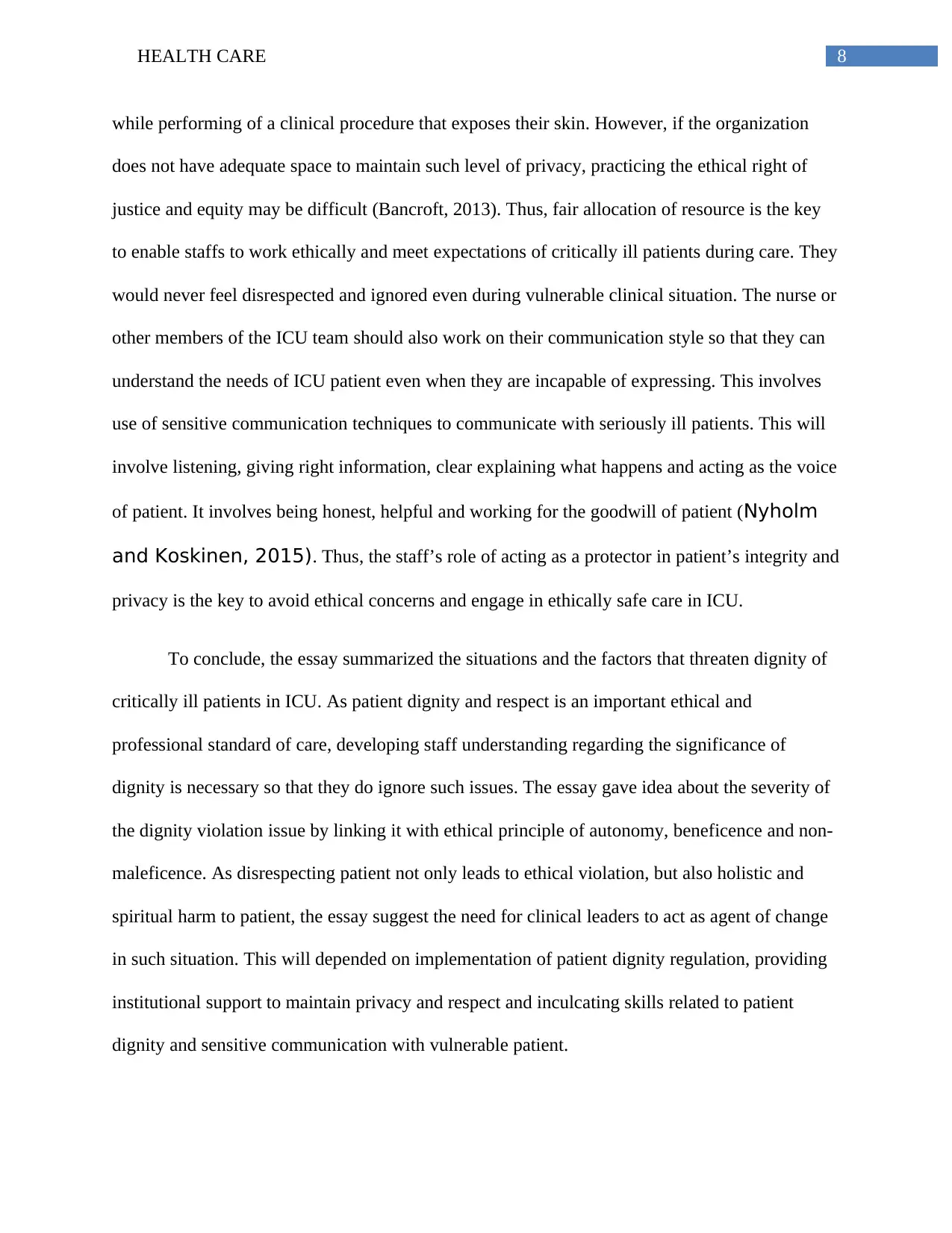
8HEALTH CARE
while performing of a clinical procedure that exposes their skin. However, if the organization
does not have adequate space to maintain such level of privacy, practicing the ethical right of
justice and equity may be difficult (Bancroft, 2013). Thus, fair allocation of resource is the key
to enable staffs to work ethically and meet expectations of critically ill patients during care. They
would never feel disrespected and ignored even during vulnerable clinical situation. The nurse or
other members of the ICU team should also work on their communication style so that they can
understand the needs of ICU patient even when they are incapable of expressing. This involves
use of sensitive communication techniques to communicate with seriously ill patients. This will
involve listening, giving right information, clear explaining what happens and acting as the voice
of patient. It involves being honest, helpful and working for the goodwill of patient (Nyholm
and Koskinen, 2015). Thus, the staff’s role of acting as a protector in patient’s integrity and
privacy is the key to avoid ethical concerns and engage in ethically safe care in ICU.
To conclude, the essay summarized the situations and the factors that threaten dignity of
critically ill patients in ICU. As patient dignity and respect is an important ethical and
professional standard of care, developing staff understanding regarding the significance of
dignity is necessary so that they do ignore such issues. The essay gave idea about the severity of
the dignity violation issue by linking it with ethical principle of autonomy, beneficence and non-
maleficence. As disrespecting patient not only leads to ethical violation, but also holistic and
spiritual harm to patient, the essay suggest the need for clinical leaders to act as agent of change
in such situation. This will depended on implementation of patient dignity regulation, providing
institutional support to maintain privacy and respect and inculcating skills related to patient
dignity and sensitive communication with vulnerable patient.
while performing of a clinical procedure that exposes their skin. However, if the organization
does not have adequate space to maintain such level of privacy, practicing the ethical right of
justice and equity may be difficult (Bancroft, 2013). Thus, fair allocation of resource is the key
to enable staffs to work ethically and meet expectations of critically ill patients during care. They
would never feel disrespected and ignored even during vulnerable clinical situation. The nurse or
other members of the ICU team should also work on their communication style so that they can
understand the needs of ICU patient even when they are incapable of expressing. This involves
use of sensitive communication techniques to communicate with seriously ill patients. This will
involve listening, giving right information, clear explaining what happens and acting as the voice
of patient. It involves being honest, helpful and working for the goodwill of patient (Nyholm
and Koskinen, 2015). Thus, the staff’s role of acting as a protector in patient’s integrity and
privacy is the key to avoid ethical concerns and engage in ethically safe care in ICU.
To conclude, the essay summarized the situations and the factors that threaten dignity of
critically ill patients in ICU. As patient dignity and respect is an important ethical and
professional standard of care, developing staff understanding regarding the significance of
dignity is necessary so that they do ignore such issues. The essay gave idea about the severity of
the dignity violation issue by linking it with ethical principle of autonomy, beneficence and non-
maleficence. As disrespecting patient not only leads to ethical violation, but also holistic and
spiritual harm to patient, the essay suggest the need for clinical leaders to act as agent of change
in such situation. This will depended on implementation of patient dignity regulation, providing
institutional support to maintain privacy and respect and inculcating skills related to patient
dignity and sensitive communication with vulnerable patient.
⊘ This is a preview!⊘
Do you want full access?
Subscribe today to unlock all pages.

Trusted by 1+ million students worldwide
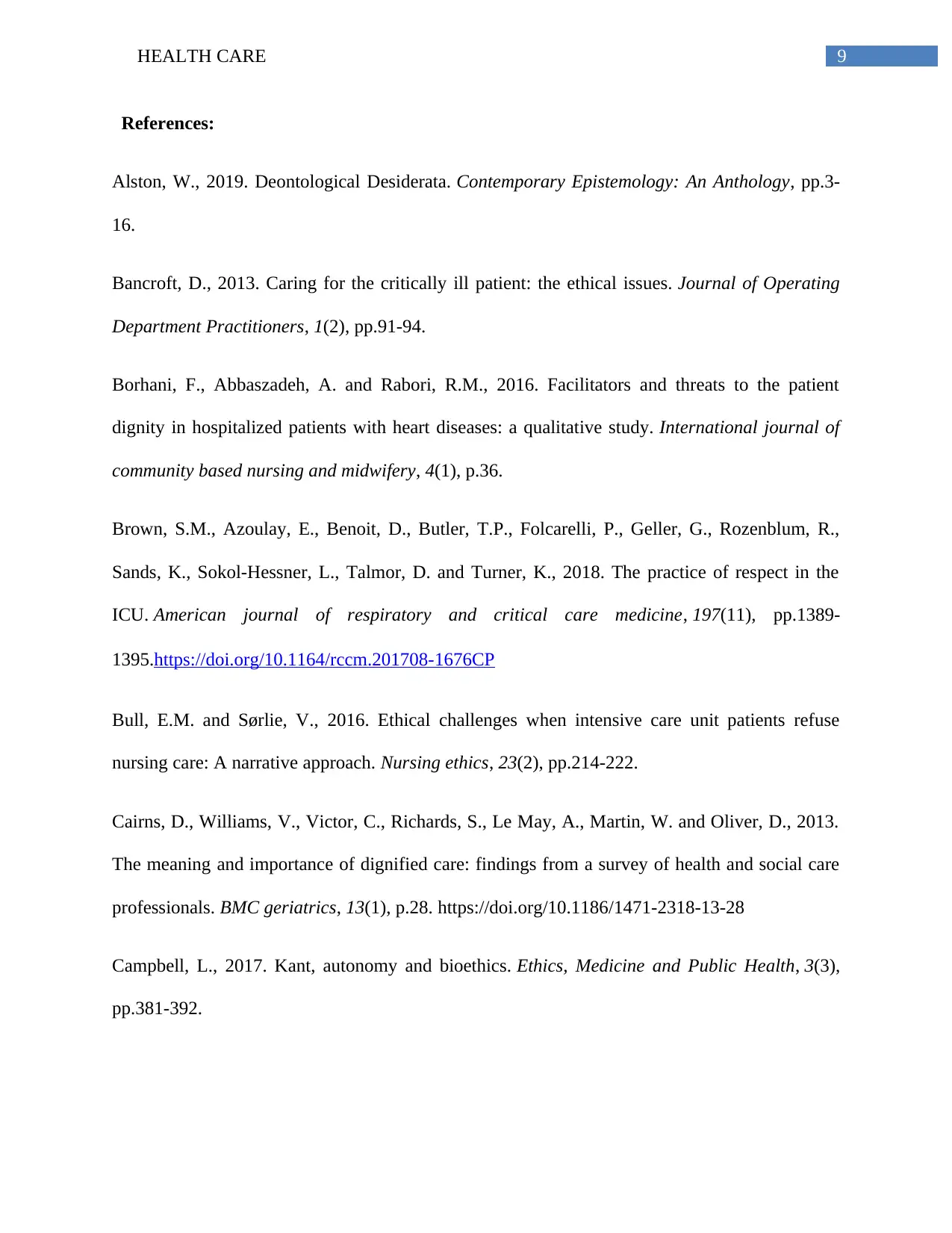
9HEALTH CARE
References:
Alston, W., 2019. Deontological Desiderata. Contemporary Epistemology: An Anthology, pp.3-
16.
Bancroft, D., 2013. Caring for the critically ill patient: the ethical issues. Journal of Operating
Department Practitioners, 1(2), pp.91-94.
Borhani, F., Abbaszadeh, A. and Rabori, R.M., 2016. Facilitators and threats to the patient
dignity in hospitalized patients with heart diseases: a qualitative study. International journal of
community based nursing and midwifery, 4(1), p.36.
Brown, S.M., Azoulay, E., Benoit, D., Butler, T.P., Folcarelli, P., Geller, G., Rozenblum, R.,
Sands, K., Sokol-Hessner, L., Talmor, D. and Turner, K., 2018. The practice of respect in the
ICU. American journal of respiratory and critical care medicine, 197(11), pp.1389-
1395.https://doi.org/10.1164/rccm.201708-1676CP
Bull, E.M. and Sørlie, V., 2016. Ethical challenges when intensive care unit patients refuse
nursing care: A narrative approach. Nursing ethics, 23(2), pp.214-222.
Cairns, D., Williams, V., Victor, C., Richards, S., Le May, A., Martin, W. and Oliver, D., 2013.
The meaning and importance of dignified care: findings from a survey of health and social care
professionals. BMC geriatrics, 13(1), p.28. https://doi.org/10.1186/1471-2318-13-28
Campbell, L., 2017. Kant, autonomy and bioethics. Ethics, Medicine and Public Health, 3(3),
pp.381-392.
References:
Alston, W., 2019. Deontological Desiderata. Contemporary Epistemology: An Anthology, pp.3-
16.
Bancroft, D., 2013. Caring for the critically ill patient: the ethical issues. Journal of Operating
Department Practitioners, 1(2), pp.91-94.
Borhani, F., Abbaszadeh, A. and Rabori, R.M., 2016. Facilitators and threats to the patient
dignity in hospitalized patients with heart diseases: a qualitative study. International journal of
community based nursing and midwifery, 4(1), p.36.
Brown, S.M., Azoulay, E., Benoit, D., Butler, T.P., Folcarelli, P., Geller, G., Rozenblum, R.,
Sands, K., Sokol-Hessner, L., Talmor, D. and Turner, K., 2018. The practice of respect in the
ICU. American journal of respiratory and critical care medicine, 197(11), pp.1389-
1395.https://doi.org/10.1164/rccm.201708-1676CP
Bull, E.M. and Sørlie, V., 2016. Ethical challenges when intensive care unit patients refuse
nursing care: A narrative approach. Nursing ethics, 23(2), pp.214-222.
Cairns, D., Williams, V., Victor, C., Richards, S., Le May, A., Martin, W. and Oliver, D., 2013.
The meaning and importance of dignified care: findings from a survey of health and social care
professionals. BMC geriatrics, 13(1), p.28. https://doi.org/10.1186/1471-2318-13-28
Campbell, L., 2017. Kant, autonomy and bioethics. Ethics, Medicine and Public Health, 3(3),
pp.381-392.
Paraphrase This Document
Need a fresh take? Get an instant paraphrase of this document with our AI Paraphraser
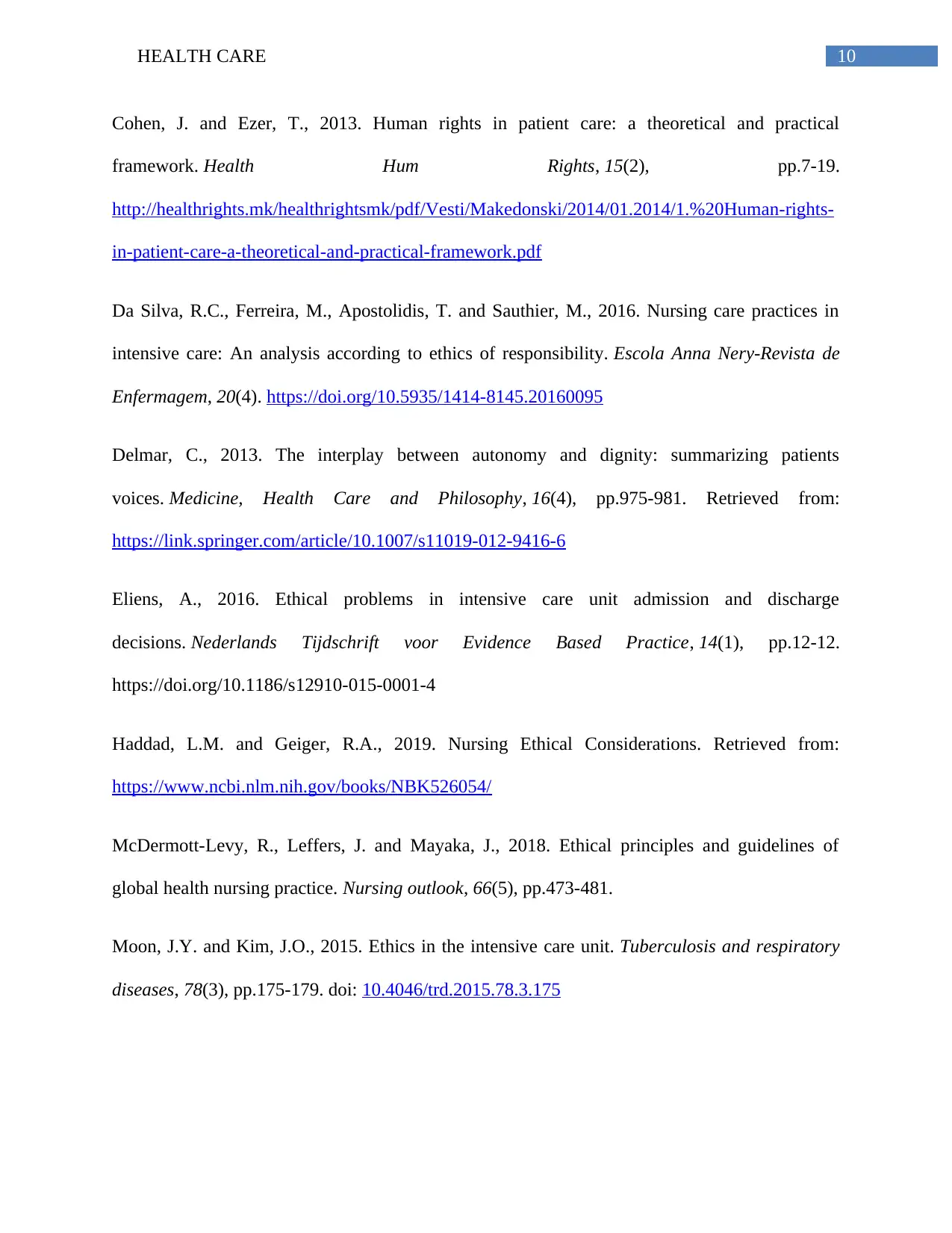
10HEALTH CARE
Cohen, J. and Ezer, T., 2013. Human rights in patient care: a theoretical and practical
framework. Health Hum Rights, 15(2), pp.7-19.
http://healthrights.mk/healthrightsmk/pdf/Vesti/Makedonski/2014/01.2014/1.%20Human-rights-
in-patient-care-a-theoretical-and-practical-framework.pdf
Da Silva, R.C., Ferreira, M., Apostolidis, T. and Sauthier, M., 2016. Nursing care practices in
intensive care: An analysis according to ethics of responsibility. Escola Anna Nery-Revista de
Enfermagem, 20(4). https://doi.org/10.5935/1414-8145.20160095
Delmar, C., 2013. The interplay between autonomy and dignity: summarizing patients
voices. Medicine, Health Care and Philosophy, 16(4), pp.975-981. Retrieved from:
https://link.springer.com/article/10.1007/s11019-012-9416-6
Eliens, A., 2016. Ethical problems in intensive care unit admission and discharge
decisions. Nederlands Tijdschrift voor Evidence Based Practice, 14(1), pp.12-12.
https://doi.org/10.1186/s12910-015-0001-4
Haddad, L.M. and Geiger, R.A., 2019. Nursing Ethical Considerations. Retrieved from:
https://www.ncbi.nlm.nih.gov/books/NBK526054/
McDermott-Levy, R., Leffers, J. and Mayaka, J., 2018. Ethical principles and guidelines of
global health nursing practice. Nursing outlook, 66(5), pp.473-481.
Moon, J.Y. and Kim, J.O., 2015. Ethics in the intensive care unit. Tuberculosis and respiratory
diseases, 78(3), pp.175-179. doi: 10.4046/trd.2015.78.3.175
Cohen, J. and Ezer, T., 2013. Human rights in patient care: a theoretical and practical
framework. Health Hum Rights, 15(2), pp.7-19.
http://healthrights.mk/healthrightsmk/pdf/Vesti/Makedonski/2014/01.2014/1.%20Human-rights-
in-patient-care-a-theoretical-and-practical-framework.pdf
Da Silva, R.C., Ferreira, M., Apostolidis, T. and Sauthier, M., 2016. Nursing care practices in
intensive care: An analysis according to ethics of responsibility. Escola Anna Nery-Revista de
Enfermagem, 20(4). https://doi.org/10.5935/1414-8145.20160095
Delmar, C., 2013. The interplay between autonomy and dignity: summarizing patients
voices. Medicine, Health Care and Philosophy, 16(4), pp.975-981. Retrieved from:
https://link.springer.com/article/10.1007/s11019-012-9416-6
Eliens, A., 2016. Ethical problems in intensive care unit admission and discharge
decisions. Nederlands Tijdschrift voor Evidence Based Practice, 14(1), pp.12-12.
https://doi.org/10.1186/s12910-015-0001-4
Haddad, L.M. and Geiger, R.A., 2019. Nursing Ethical Considerations. Retrieved from:
https://www.ncbi.nlm.nih.gov/books/NBK526054/
McDermott-Levy, R., Leffers, J. and Mayaka, J., 2018. Ethical principles and guidelines of
global health nursing practice. Nursing outlook, 66(5), pp.473-481.
Moon, J.Y. and Kim, J.O., 2015. Ethics in the intensive care unit. Tuberculosis and respiratory
diseases, 78(3), pp.175-179. doi: 10.4046/trd.2015.78.3.175
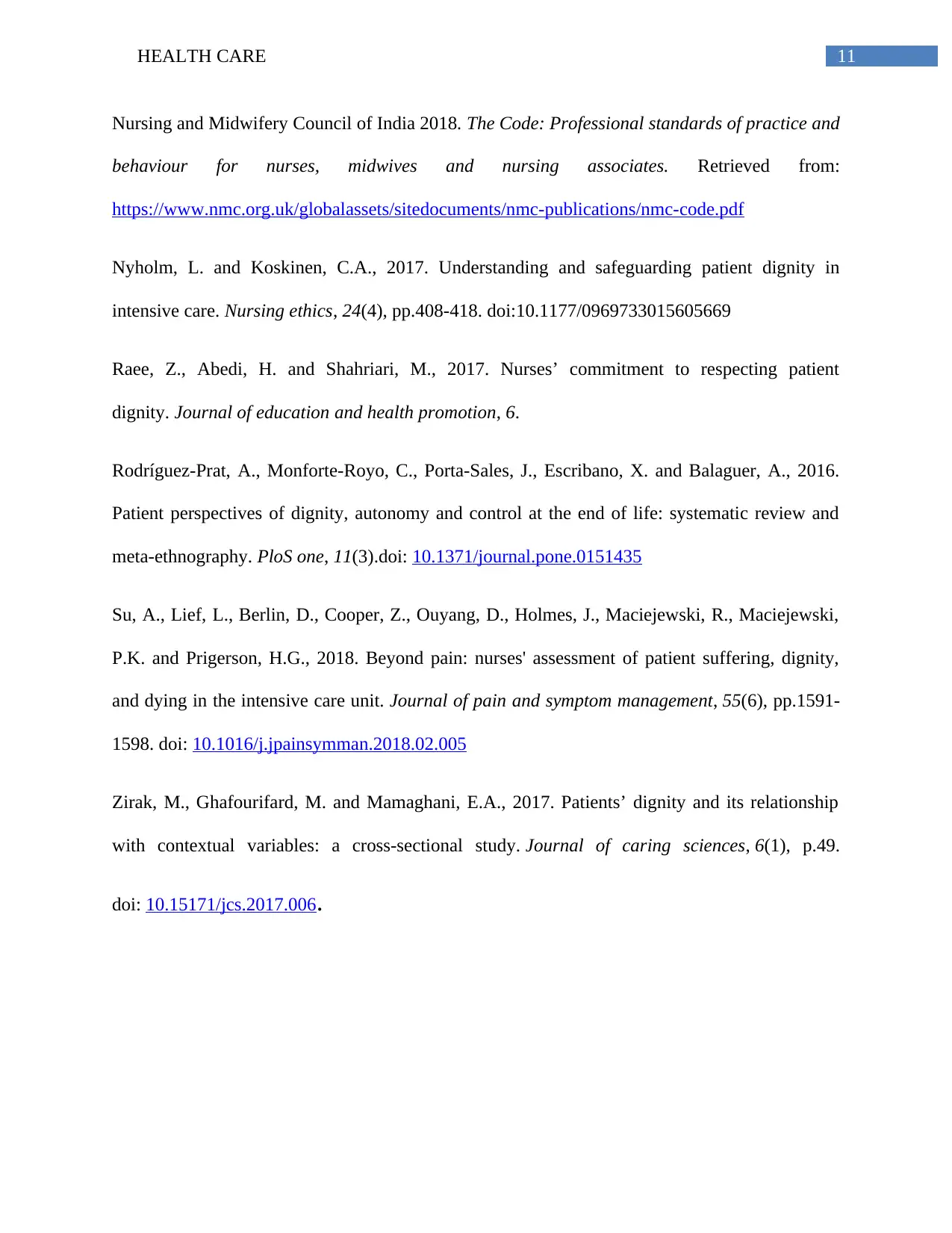
11HEALTH CARE
Nursing and Midwifery Council of India 2018. The Code: Professional standards of practice and
behaviour for nurses, midwives and nursing associates. Retrieved from:
https://www.nmc.org.uk/globalassets/sitedocuments/nmc-publications/nmc-code.pdf
Nyholm, L. and Koskinen, C.A., 2017. Understanding and safeguarding patient dignity in
intensive care. Nursing ethics, 24(4), pp.408-418. doi:10.1177/0969733015605669
Raee, Z., Abedi, H. and Shahriari, M., 2017. Nurses’ commitment to respecting patient
dignity. Journal of education and health promotion, 6.
Rodríguez-Prat, A., Monforte-Royo, C., Porta-Sales, J., Escribano, X. and Balaguer, A., 2016.
Patient perspectives of dignity, autonomy and control at the end of life: systematic review and
meta-ethnography. PloS one, 11(3).doi: 10.1371/journal.pone.0151435
Su, A., Lief, L., Berlin, D., Cooper, Z., Ouyang, D., Holmes, J., Maciejewski, R., Maciejewski,
P.K. and Prigerson, H.G., 2018. Beyond pain: nurses' assessment of patient suffering, dignity,
and dying in the intensive care unit. Journal of pain and symptom management, 55(6), pp.1591-
1598. doi: 10.1016/j.jpainsymman.2018.02.005
Zirak, M., Ghafourifard, M. and Mamaghani, E.A., 2017. Patients’ dignity and its relationship
with contextual variables: a cross-sectional study. Journal of caring sciences, 6(1), p.49.
doi: 10.15171/jcs.2017.006.
Nursing and Midwifery Council of India 2018. The Code: Professional standards of practice and
behaviour for nurses, midwives and nursing associates. Retrieved from:
https://www.nmc.org.uk/globalassets/sitedocuments/nmc-publications/nmc-code.pdf
Nyholm, L. and Koskinen, C.A., 2017. Understanding and safeguarding patient dignity in
intensive care. Nursing ethics, 24(4), pp.408-418. doi:10.1177/0969733015605669
Raee, Z., Abedi, H. and Shahriari, M., 2017. Nurses’ commitment to respecting patient
dignity. Journal of education and health promotion, 6.
Rodríguez-Prat, A., Monforte-Royo, C., Porta-Sales, J., Escribano, X. and Balaguer, A., 2016.
Patient perspectives of dignity, autonomy and control at the end of life: systematic review and
meta-ethnography. PloS one, 11(3).doi: 10.1371/journal.pone.0151435
Su, A., Lief, L., Berlin, D., Cooper, Z., Ouyang, D., Holmes, J., Maciejewski, R., Maciejewski,
P.K. and Prigerson, H.G., 2018. Beyond pain: nurses' assessment of patient suffering, dignity,
and dying in the intensive care unit. Journal of pain and symptom management, 55(6), pp.1591-
1598. doi: 10.1016/j.jpainsymman.2018.02.005
Zirak, M., Ghafourifard, M. and Mamaghani, E.A., 2017. Patients’ dignity and its relationship
with contextual variables: a cross-sectional study. Journal of caring sciences, 6(1), p.49.
doi: 10.15171/jcs.2017.006.
⊘ This is a preview!⊘
Do you want full access?
Subscribe today to unlock all pages.

Trusted by 1+ million students worldwide
1 out of 13
Related Documents
Your All-in-One AI-Powered Toolkit for Academic Success.
+13062052269
info@desklib.com
Available 24*7 on WhatsApp / Email
![[object Object]](/_next/static/media/star-bottom.7253800d.svg)
Unlock your academic potential
Copyright © 2020–2026 A2Z Services. All Rights Reserved. Developed and managed by ZUCOL.




